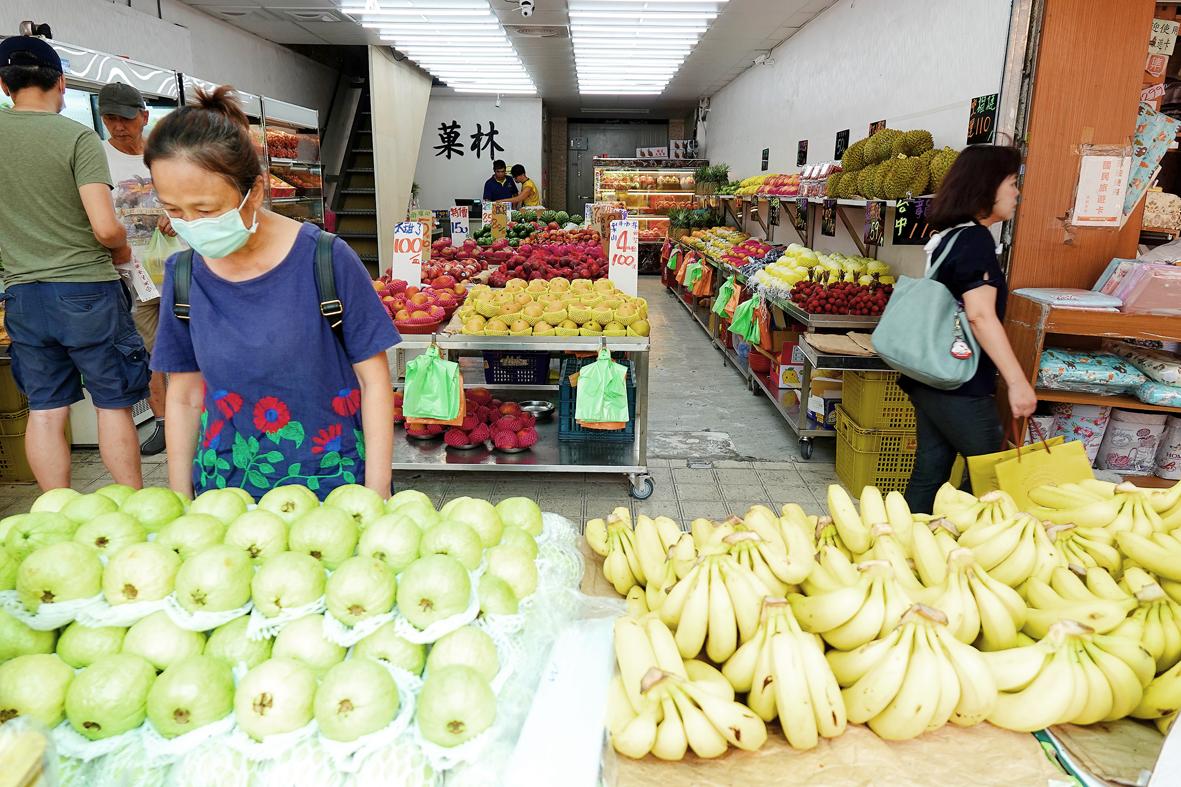The Directorate-General of Budget, Accounting and Statistics (DGBAS) yesterday said that it would release its producer price index (PPI) on a monthly basis starting next year to better capture movements in selling prices from domestic production and to stay with the global trend.
The agency said that it has finished compiling its latest PPI data and plans to present them to the quarterly review committee next month to update the nation’s GDP growth and per capita income.
DGBAS has relied on the wholesale price index (WPI) to track the cost of production for the past 40 years, while most economies worldwide favor PPI, widely considered an objective tool for adjusting prices in long-term purchasing agreements, it said.

Photo: CNA
Because prices fluctuate, long-term deals are difficult with only a single, fixed price for goods or supplies, so the purchasing business and the supplier typically include a clause in the contract that adjusts the cost by external indicators, such as PPI, it said.
It is time for the DGBAS to adjust and link up with the world after decades of guiding its inflation observations using the consumer price index and cost of production with WPI, DGBAS officials told Chinese-language media.
WPI reflects purchase costs and factory-gate prices, making its boundary less clear-cut in measuring production costs and GDP, the officials said.
PPI would limit its survey to domestic producers — exporters and importers — and omit trading companies and re-exporters, as trading firms are not manufacturers and re-exporters make a profit by processing foreign goods, they said.
DGBAS has long sought to compile PPI and replace WPI, but hesitated due to concerns over rules governing asset revaluations of profit-making organizations and WPI links to basic labor wages, the agency said.
As a result, WPI would continue with PPI, unless people mix them up, it said.

JITTERS: Nexperia has a 20 percent market share for chips powering simpler features such as window controls, and changing supply chains could take years European carmakers are looking into ways to scratch components made with parts from China, spooked by deepening geopolitical spats playing out through chipmaker Nexperia BV and Beijing’s export controls on rare earths. To protect operations from trade ructions, several automakers are pushing major suppliers to find permanent alternatives to Chinese semiconductors, people familiar with the matter said. The industry is considering broader changes to its supply chain to adapt to shifting geopolitics, Europe’s main suppliers lobby CLEPA head Matthias Zink said. “We had some indications already — questions like: ‘How can you supply me without this dependency on China?’” Zink, who also

Taiwan Semiconductor Manufacturing Co (TSMC, 台積電) received about NT$147 billion (US$4.71 billion) in subsidies from the US, Japanese, German and Chinese governments over the past two years for its global expansion. Financial data compiled by the world’s largest contract chipmaker showed the company secured NT$4.77 billion in subsidies from the governments in the third quarter, bringing the total for the first three quarters of the year to about NT$71.9 billion. Along with the NT$75.16 billion in financial aid TSMC received last year, the chipmaker obtained NT$147 billion in subsidies in almost two years, the data showed. The subsidies received by its subsidiaries —

At least US$50 million for the freedom of an Emirati sheikh: That is the king’s ransom paid two weeks ago to militants linked to al-Qaeda who are pushing to topple the Malian government and impose Islamic law. Alongside a crippling fuel blockade, the Group for the Support of Islam and Muslims (JNIM) has made kidnapping wealthy foreigners for a ransom a pillar of its strategy of “economic jihad.” Its goal: Oust the junta, which has struggled to contain Mali’s decade-long insurgency since taking power following back-to-back coups in 2020 and 2021, by scaring away investors and paralyzing the west African country’s economy.

The number of Taiwanese working in the US rose to a record high of 137,000 last year, driven largely by Taiwan Semiconductor Manufacturing Co’s (TSMC, 台積電) rapid overseas expansion, according to government data released yesterday. A total of 666,000 Taiwanese nationals were employed abroad last year, an increase of 45,000 from 2023 and the highest level since the COVID-19 pandemic, data from the Directorate-General of Budget, Accounting and Statistics (DGBAS) showed. Overseas employment had steadily increased between 2009 and 2019, peaking at 739,000, before plunging to 319,000 in 2021 amid US-China trade tensions, global supply chain shifts, reshoring by Taiwanese companies and